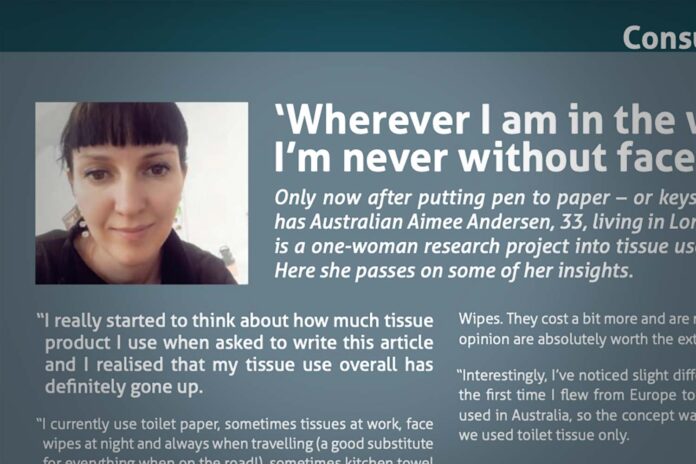Only now after putting pen to paper – or keystroke to screen – has Australian Aimee Andersen, 33, living in London, realised she is a one-woman research project into tissue use across cultures. Here she passes on some of her insights.
“I really started to think about how much tissue product I use when asked to write this article and I realised that my tissue use overall has definitely gone up.”
“I currently use toilet paper, sometimes tissues at work, face wipes at night and always when travelling (a good substitute for everything when on the road!), sometimes kitchen towel and cotton pads. This time ten years ago it was literally just toilet paper and occasionally face wipes. I currently use kitchen towel strictly in the kitchen and usually only to clean up a spill, and I use recyclable cloth for cleaning surfaces; toilet paper I consider a staple necessity. I use tissues occasionally and only at work when cold and flu season hits the office. Cotton pads and face wipes are part of my nightly face cleaning ritual. I have started using kitchen towel and tissues as a matter of convenience.
“Living in London, I find that only particular stores will sell the re-usable kitchen cloth and bamboo cotton face wipes I prefer to use and I can’t always get to these particular locations, so the convenience of other paper products tends to override my desire to buy re-usable products.”
“When it comes to kitchen towels and toilet paper, I don’t stick to particular brands. As they are disposable and will be disposed of at a very fast rate, I buy the no-name brands, usually from the no-name toiletries stores we have here in London and that are on my route home. I have to admit that I hope that they are recyclable, although I haven’t looked into this issue properly, which is another dramatic change in my habits. There was a time when I would only buy certified recyclable toilet tissue, but convenience has won again on this issue and I buy bulk and cheap. They need to be good enough quality though, if they are too thin, then cheapest is not the best.”
“But I am much fussier about face wipes and tissues. I admit to sentimental buying choices when it comes to tissues, my mum bought Kleenex when I was a child, and I’ve continued to carry on that buying practice.”
“In regards to face wipes, I am very aware of the chemicals that are used, and like to find face wipes that are low on abrasive chemicals in the manufacture and end product. I also am aware that a lot of face wipes aren’t biodegradable (or are much slower to break down than other tissue products), so my preferred choices are the Body Shop, Yes to and Eco Wipes. They cost a bit more and are mostly online, but in my opinion are absolutely worth the extra hassle and expense.”
“Interestingly, I’ve noticed slight differences in tissue habits the first time I flew from Europe to Australia. Bidets aren’t used in Australia, so the concept was a foreign one to me – we used toilet tissue only.”
“ I found that some islands I went to in Greece, Italy and Spain in particular seemed less concerned about toilet and toilet paper usage compared to Australia (think the toilet without a cistern, thin, almost no-existent toilet paper). This was my first experience of walking into a cubicle that was literally a ceramic hole in the ground, and minimal-to-no tissue/paper in sight! People would be likely to complain and not use the facilities if it was the case in Australia, so I found the attitudes in the areas I visited much more relaxed in comparison.”
“After this, I went travelling in South East Asia where there was quite widespread poverty and the facilities and access to toilet paper/tissues could sometimes be limited-to-nil. Even when camping in Australia in remote areas with no facilities, toilet paper is considered a necessity. This is why I am never without face wipes!”
“Having studied anthropology, I have always had a keen interest in cultural differences, and I have found that quite a large portion of the world that I have visited will actually only handle toilet paper/tissues/etc. with their left hand, as their right hand is used for eating. It is a very interesting observation when asking for toilet tissue at a hotel counter/supermarket/etc that you will be passed almost everything else with a person’s right hand, but toilet paper and tissues (or anything else that is related to bodily functions) will be passed to you with a left hand. You, the receiver, if observing cultural norms, would accept everything given to you with your right hand, but toilet paper/tissues with your left. I saw this a lot in South East Asia, and when talking to many of my friends from Asia (I specifically asked friends from Gambia, Tunisia and Bangladesh), they all confirmed to me this was true of their cultures.
“Coming from Australia and now living in London it highlights to me how this is actually a luxury, not a necessity, by the fact that there is no conscious cultural norm within my own culture that highlights why I would use these products the way I do.”

































